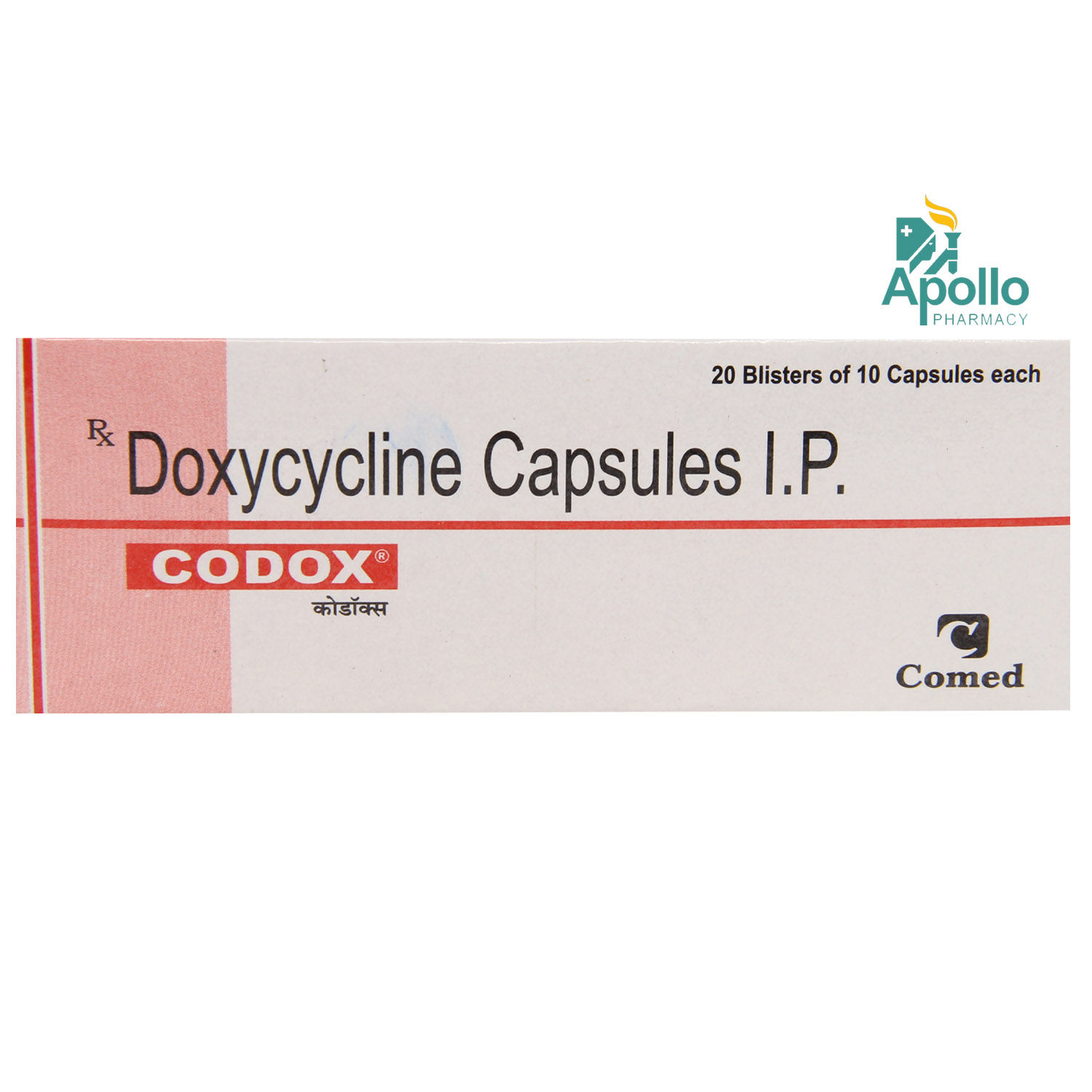Dox-100 Tablet 8's
₹31.1*
MRP ₹34.5
10% off
₹29.32*
MRP ₹34.5
15% CB
₹5.18 cashback(15%)
Free Delivery
With Circle membership
(Inclusive of all Taxes)
This offer price is valid on orders above ₹800. Apply coupon PHARMA10/PHARMA18 (excluding restricted items)
Know Your Delivery Time
Provide Delivery Location


Available Offers
 Prescription drug
Prescription drugWhats That

Secure Payment

India's Most Trusted Pharmacy

Genuine Products
Composition :
Manufacturer/Marketer :
Consume Type :
Return Policy :
Expires on or after :
About Dox-100 Tablet
Dox-100 Tablet is used to treat bacterial infections. Dox-100 Tablet treats urinary tract infections, intestinal infections, respiratory infections, eye infections, sexually transmitted infections (like gonorrhoea and syphilis), gum infections, diseases (like periodontitis), and others. Besides this, Dox-100 Tablet also treats acne-like lesions caused by rosacea. However, it does not treat facial redness caused by rosacea.
Dox-100 Tablet being an antibiotic prevents the growth of bacterial cells (the bad ones!) by preventing the formation of the outer protein layer of bacteria (cell wall) responsible for bacteria's growth and multiplication. It is a broad-spectrum antibiotic, i.e. it acts against various bacteria. It is a bacteriostatic antibiotic, i.e. it stops bacteria growth but does not kill them.
Dox-100 Tablet should only be taken if advised by your doctor. It can be taken with or without food but should be consumed at a fixed time for the best results. You should complete the course of Dox-100 Tablet as your doctor prescribes for better results. Some common side effects of Dox-100 Tablet are nausea (feeling or being sick), vomiting, diarrhoea, etc. Please consult your doctor if these side effects become troublesome.
Dox-100 Tablet is pregnancy category D (high risk) medicines, so its use in pregnant and nursing mothers is not recommended. Use of Dox-100 Tablet during tooth development (last half of pregnancy, infancy, and childhood up to the age of 8 years) may cause teeth staining (yellow-grey-brown). Do not consume alcohol as it may cause excessive drowsiness when taken along with Dox-100 Tablet. Before using Dox-100 Tablet, tell your doctor if you ever had an allergy to Dox-100 Tablet, have kidney problems, liver problems, swollen food pipe (esophagitis) or muscle disease (myasthenia gravis). Please do not drink alcohol with Dox-100 Tablet as it may increase the unpleasant side effects like drowsiness and dizziness.
Uses of Dox-100 Tablet
Directions for Use
Medicinal Benefits
Dox-100 Tablet is a type of tetracycline class of antibiotic which is effective against a wide range of bacteria, including gram-negative and gram-positive bacteria, anaerobes, and some parasites. It is prescribed for treating various bacterial infections of the respiratory tract (influenza, pneumonia), genitourinary area (syphilis, gonorrhoea), anthrax infection, sinuses, eyes, and skin. Besides this, it is also indicated in the tick-borne infections (typhus fever) caused by the Rickettsia group of bacteria like typhus fever. Off-label, usage includes the prophylaxis or prevention of malaria in the prone area and the treatment of acne. Sometimes, your doctor might prescribe you Dox-100 Tablet as an alternative medicine to penicillin when penicillin is contraindicated.
How Dox-100 Tablet Works
Storage
Side Effects of Dox-100 Tablet
- Nausea (feeling sick)
- Vomiting
- Diarrhoea
What if I have taken an overdose of Dox-100 Tablet
Drug Warnings
Iron and antacid (like magnesium hydroxide and aluminium hydroxide) may bind to Dox-100 Tablet in the gastrointestinal tract, lowering its efficiency. So, a gap of at least 2 hours should be maintained between intake of Dox-100 Tablet and iron supplements and antacids. Prolonged use of Dox-100 Tablet during tooth development (last half of pregnancy, infancy, and childhood to the age of 8 years) may cause permanent discolouration of the teeth (yellow-grey-brown). Besides this, in some cases, the use of Dox-100 Tablet causes antibiotic-associated diarrhoea. Dox-100 Tablet may cause sensitive skin to sunlight and ultraviolet rays, causing an exaggerated sunburn reaction. Hence it is advisable to apply sunscreen before going outside. Its use has also been associated with an increased risk of fungal skin infections like (vaginal candidiasis - thrush). Tetracycline and Dox-100 Tablet can form a stable calcium complex in bone-forming tissue, thereby affecting the growth of fibula bones in young children and bone development in the foetus. Using a Dox-100 Tablet with isotretinoin should be avoided as it has been reported to cause pseudotumor cerebri (increased pressure inside the brain). Long-term use of Dox-100 Tablet may affect your blood, kidney, and liver health, so yearly diagnostics test of these parameters is recommended. Dox-100 Tablet does not completely prevent malaria caused by P. falciparum as a Dox-100 Tablet is given only for the prophylactic regimen (protection) whenever anyone enters a malaria-prone area.
Diet & Lifestyle Advise
It would be best to take probiotics after taking the full course of Dox-100 Tablet to restore some healthy bacteria in the intestine that may have been killed. Taking probiotics after antibiotic treatment can reduce the risk of antibiotic-associated diarrhoea. Certain fermented foods like yoghurt, cheese, sauerkraut and kimchi can help restore the intestine's good bacteria.
Include more fibre-enriched food in your diet, as it can be easily digested by gut bacteria which helps stimulate their growth. Thus fibre foods may help restore healthy gut bacteria after taking a course of antibiotics. Whole grains like whole-grain bread, and brown rice, should be included in your diet.
Avoid taking too much calcium enriched foods and drinks as it might affect the working of Dox-100 Tablet.
Avoid intake of alcoholic beverages with Dox-100 Tablet as it can make you dehydrated and affect your sleep. This can make it harder for your body to aid the Dox-100 Tablet in fighting off infections.
Habit Forming
Therapeutic Class
Dox-100 Tablet Substitute

Doxy T 100 Capsule 8's
by AYUR
₹4.50per tabletMinicycline Capsule 10's
₹3.11per tabletCodox Capsule 10's
₹3.11per tabletPepdox 100 Capsule 10's
₹9.45per tabletNudoxy Capsule 10's
₹3.28per tablet
Product Substitutes
Alcohol
Unsafe
Dox-100 Tablet should not be taken until prescribed if you are taking alcohol. Keep your doctor informed if you drink alcohol.
Pregnancy
Unsafe
Dox-100 Tablet is a Pregnancy Category D. There are no adequate and well-controlled studies on the use of doxycycline in pregnant women. In some cases, taking Dox-100 Tablet during pregnancy may affect tooth and bone development in the unborn baby. So, if you are pregnant or planning for pregnancy contact the doctor before using a Dox-100 Tablet.
Breast Feeding
Caution
Dox-100 Tablet is excreted in the breast milk however, the extent of absorption of Dox-100 Tablet, by the breastfed infant is not known. Hence, the nursing mother before using a Dox-100 Tablet should contact the doctor.
Driving
Safe if prescribed
The effect of doxycycline on the ability to drive or operate heavy machinery has not been fully studied but there is no evidence to suggest that doxycycline may affect the ability to drive. Discuss with your doctor if you have any concerns or are having unusual sleepiness or drowsiness after taking Dox-100 Tablet.
Liver
Caution
Dox-100 Tablet to be taken with caution, especially if you have a history of liver diseases/conditions. Dose may have to be adjusted by your doctor.
Kidney
Safe if prescribed
At the recommended doses, Dox-100 Tablet is safe to use in patients with kidney disease and no dose adjustment is warranted. If prescribed by a doctor, Dox-100 Tablet can be safely used. But it is best to discuss with your doctor if you have a known kidney disease/condition.
Children
Unsafe
Use of Dox-100 Tablet during tooth development in infants and children below 8 years of age may cause permanent staining of teeth (yellow-grey-brown). So, it is not recommended for children below 8 years of age.
FAQs
Country of origin
Manufacturer/Marketer address
Customers Also Bought
Disclaimer
Author Details
We provide you with authentic, trustworthy and relevant information
Reference
- https://www.drugs.com/tips/doxycycline-patient-tips
- https://www.medicines.org.uk/emc/files/pil.4063.pdf
- https://www.nhs.uk/medicines/doxycycline/
- https://www.accessdata.fda.gov/drugsatfda_docs/label/2008/050795s005lbl.pdf
- https://www.onhealth.com/content/1/bacterial_infections
- https://neurology.uams.edu/wp-content/uploads/sites/49/2018/03/Drugs-that-may-worsen-Myasthenia-Gravis.pdf
- https://www.ncbi.nlm.nih.gov/books/NBK549818/
- https://www.ncbi.nlm.nih.gov/books/NBK555888/

















